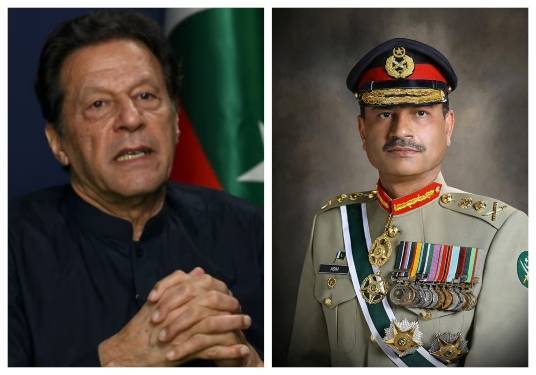
As former prime minister Imran Khan on Monday completed a full year of being arrested in what he claims were trumped-up political cases, all in response to violence and riots against state institutions on May 9, 2023, the military stated that they had not changed their stance on Imran or May 9 perpetrators.
On Monday, the Inter-Services Public Relations (ISPR) Director General, Lt Gen Ahmed Sharif Chaudhry, held a briefing for the media on the security situation in the country. During the briefing, he was asked about reports of backdoor talks between Imran and the military and a softening of the stance on either side, especially the latter's stance on May 9.
Lt Gen Chaudhry, however, categorically rejected it.
"The Army's stance on [May 9] is clear, which was conveyed in the May 7 press conference [by senior military officers]. There has been no change in that and there will be, no change" he stated.
His comments came a day after Imran Khan's latest statement, in which he seemed to soften his stance towards the military, stating that it would be "foolish" not to have "excellent" relations with it.
Imran, however, went on to describe his conflict with the military as a conflict with certain individuals and not the institution.
"The miscalculations of the military leadership shouldn't be held against the institution as a whole," Imran had stated as we offered to hold "conditional negotiations." The conditions include releasing those accused of being involved in May 9 attacks by dropping the 'bogus' cases against them, and accepting the true results of February 8 general elections and holding 'clean and transparent' elections.
In recent months, Imran has indirectly suggested that widespread protests on May 9 were orchestrated.
Prosecuting 'digital terrorism'
With Lt Gen Chaudhry introducing the term 'digital terrorism' in his previous news briefing, he was asked to elaborate on these activities and the military's response.
The ISPR chief said that the first line of defence against terrorism is law. However, he said that falsehoods and propaganda were rife on social media with fake news and doctored images.
He lamented that the law was not taking its course, but the armed forces were vigilant and would take legal action against those involved.
Lt Gen Chaudhry said there was a local and a foreign component to digital terrorism. He said that while there were foreign forces involved, some Pakistanis - abroad and at home- were also involved in running propaganda against the military and Pakistan.
Regarding the foreign powers involved in propaganda against Pakistan, the ISPR chief said they were well aware of its sponsors.
"We know who are the state and non-state elements proliferating this campaign," he said, adding that they aim to spread hopelessness and chaos in Pakistan.
He added that there was coordinated organisation between those involved in political lobbying, meetings and protests outside Pakistani embassies abroad.
The ISPR chief lamented that the serious sums of money spent on political propaganda could have been spent on creating positive sentiments around the country. He questioned the source of the money that was being used in these efforts and the true purpose of its donors and sponsors.
"Do you think all this money is being invested voluntarily, and there is no coordination behind it? If yes, then you are being a bit too naive."
Proxy of terrorist outfits, criminal mafia
Baloch Yakjehti Committee and its so-called leadership is a proxy of terrorist outfits and criminal elements. It is nothing more than that.
They have been tasked with creating propaganda against the law enforcement agencies working against the criminal mafias involved in terrorism and the 'illegal spectrum' of extortion and smuggling and making development projects in Balochistan controversial.
"The way they operate is to gather a vitriolic group and internationally funded propaganda, and then using that to incite locals, challenge the writ of the government, stage protests, set fires, pelt law enforcers with stones, present unwarranted demands. But when the government reacts, they pretend to be innocent. Their international backers then jump in posing as global human rights defenders.
He claimed the Balochistan government did not stop the protesters and said that they could stage their demonstration at the designated spot, protest, present reasonable demands, and negotiate with the government. However, they could not block roads. They (the protesters) said they would block the roads and that they would damage development projects [CPEC].
"You saw how they blocked roads, caused inconvenience to people, pelted stones at pilgrims, and you saw how they set fires and attacked the FC forces of the province. A soldier from Sibbi was mobbed by a crowd and beaten to death. But the law enforcers acted with restraint and did not give in to what they wanted (which was a bed of bodies).
He said that these protesters were exposed, and the people of Balochistan rejected the Raji Muchi.
Military backs peace process in Kashmir per UN resolutions
With August 5 marking five years since India annexed Kashmir by repealing Article 370 for Indian Illegally Occupied Jammu and Kashmir, Lt Gen Chaudhry highlighted the illegality of the act per international law and the atrocities being committed by India in the disputed territory.
He said that the military backs a peace process in Kashmir in line with United Nations resolutions and as per the aspersions of the people of Kashmir.

